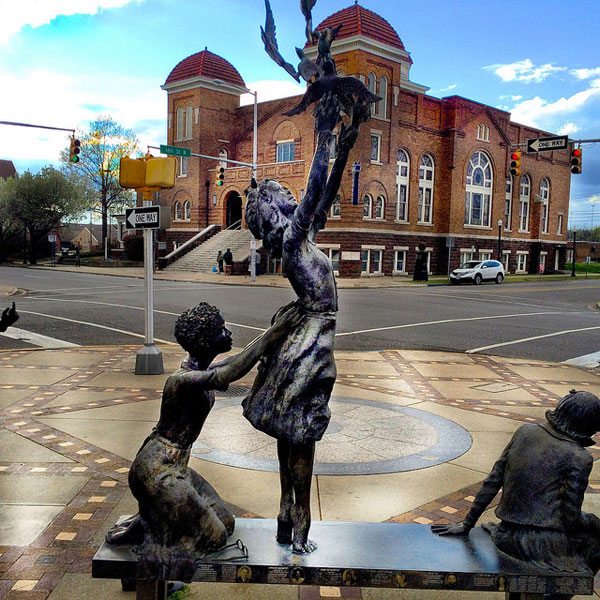
December 13, 2017; Washington Post
Last night’s Democratic win for the Alabama Senate seat vacated by Jeff Sessions was a moment full of meaning. Not only does it reduce the Republican majority in the Senate to 51 percent, but the race between the candidates itself was like a war of symbols.
The Republican candidate, Roy Moore, has been accused of sexual harassment and the abuse of teenage girls. He’s also voiced a fond longing for the good old days of slavery when families were happy together. He relied on Steve Bannon and Donald Trump in the last few days of his campaign.
Doug Jones, on the other hand, was a federal prosecutor who had convicted the Ku Klux Klansmen involved in the bombing of Birmingham’s 16th Street Baptist Church where four little girls were killed. He relied in the last few days of his campaign on black leaders like New Jersey Senator Cory Booker and Georgia Representative John Lewis. President Obama was the voice on his robocalls urging people to the polls.
Despite a lot of doomsaying by mainstream media about the strategy of relying in large part on black voters, who were deemed “unenergetic” and “uninspired,” the plan worked. As was reported in the Atlantic by Vann R. Newkirk II,
Jones won…and that script has been flipped on its head. Election day defied the narrative, and challenged traditional thinking about racial turnout in off-year elections and special elections. Precincts in the state’s “black belt,” the swathe of dark, fertile soil where the African American population is concentrated, reported long lines throughout the day, and as the night waned and red counties dominated by rural white voters continued to report disappointing results for Moore, votes surged in from urban areas and the black belt. By all accounts, black turnout exceeded expectations, perhaps even passing previous off-year results. Energy was not a problem.
Newkirk writes that grassroots organizing took the day, overcoming any barriers erected by the voter repression efforts in the state.
Sign up for our free newsletters
Subscribe to NPQ's newsletters to have our top stories delivered directly to your inbox.
By signing up, you agree to our privacy policy and terms of use, and to receive messages from NPQ and our partners.
The grassroots organizing in black communities by groups like local NAACP chapters was more muscular than it had even been in the 2016 general election. In the lead-up to Tuesday’s contest, voting-rights groups registered people with felonies, targeted awareness campaigns at people who might not have had proper ID, and focused specifically on knocking down the structures in place that keep black voters away from the polls. Their efforts immediately become a case study in how to do so in a region that has, since the Supreme Court’s 2013 Shelby County v. Holder decision curtailing the 1965 Voting Rights Act, become a bastion of new voter-suppression laws, including new voter-ID laws.
“Democrats,” Newkirk writes, “were saved by a community already fighting against the grain to be heard in the din of democracy.” In the end, the black electorate is estimated to have been approximately 28 percent of the vote in yesterday’s election, where the population of the state is only 26 percent black.
Of course, there were other factors at work in this coalition. Among voters under thirty, Jones took 60 percent. And, in the end, there had already been a withdrawal of affection from Trump before the election, as the Washington Post reported:
Other exit polls seemed to indicate that this electorate would be different than the one that came to the polls in November 2016. Trump, for instance, won Alabama with 62 percent of the vote in 2016. But preliminary exit polls Tuesday found that just under half of Alabamians approve of Trump’s performance, while about an identical share disapprove. About 4 in 10 voters say they “strongly disapprove” of Trump, compared with just over 3 in 10 who “strongly approve.”
In his victory address, Jones told the crowd, “At the end of the day this entire race has been about dignity and respect. This campaign has been about the rule of law. This campaign has been about common courtesy and decency, and making sure everyone in this state, regardless of which Zip code you live in, is going to get a fair shake in life.” Jones declared that Alabama had stood at a crossroads on that day, and said that in the past, “unfortunately, we have usually taken the wrong fork. Tonight, ladies and gentlemen, you took the right road.”
The vote may not, unfortunately, result in Jones being seated before the reconciled tax bill comes up for a vote, but it places the rest of the GOP agenda on far more shaky ground in a year where one or two votes can make a difference. And it is a moment when we owe our hardworking colleagues in Alabama a respectful bow.—Ruth McCambridge













